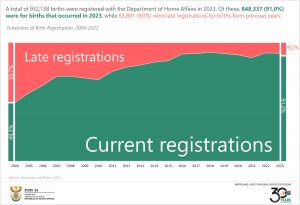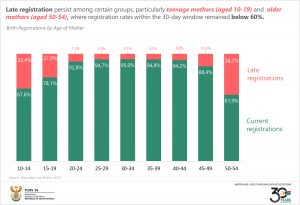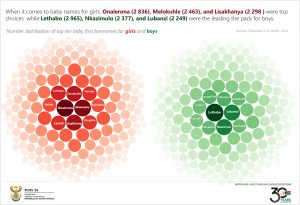Just under one million births registered in 2023
According to the Recorded Live Births data released by Statistics South Africa, a total of 932 138 births were registered with the Department of Home Affairs in 2023. Of these, 848 337 (91,0%) were for births that occurred in 2023, while 83 801 (9,0%) were late registrations of births from previous years. This distinction between current and late registrations highlights the progress made in the timely registration of children’s births.
Birth registration plays a critical role in providing a child with a legal identity, a prerequisite for accessing a range of fundamental rights. These include the right to education, healthcare, social welfare, and protection. Without a legal identity, children are often excluded from vital services, which can affect their development and overall well-being. Furthermore, the data collected during the registration process is important for national planning. It allows the government to estimate population growth, allocate resources more effectively, and shape policies that respond to the needs of citizens.
In 2023, 80,7% of all births were registered within the legally mandated 30-day period, demonstrating an overall improvement in timely registration. However, challenges persist among certain age groups, particularly teenage mothers (aged 10-19) and older mothers (aged 50-54), where registration rates within the 30-day window remained below 60,0%. These low rates of registration within specific age groups may be influenced by various social, economic, and cultural factors. Ensuring that all children are registered within the required time frame is essential for safeguarding their rights from birth.
On a lighter note, when it comes to baby names, the 2023 data revealed some clear favourites. For boys, Lethabo, Nkazimulo, and Lubanzi were leading the pack, while Onalerona, Melokuhle, and Lisakhanya were the top choices for girls. What is even more interesting is that names like Lethabo, Melokuhle, and Omphile were popular for both boys and girls. These choices often carry deep personal and cultural meanings, representing the hopes, values, and aspirations parents have for their children.
The birth data for 2023 revealed interesting trends in the seasonality of births. March recorded the highest number of births (67 829), followed closely by January (66 311) and May (66 131). Understanding seasonal patterns can help healthcare facilities prepare for peak periods and ensure that adequate maternal and newborn care services are available when they are most needed.
The data also revealed demographic shifts in maternal age, with the median age of mothers increasing to 28,3 years in 2023, the highest since 2004. This rise reflects broader global trends, where women are increasingly delaying childbirth due to factors such as education, career aspirations, and improved access to family planning. Births to mothers aged 20-34 accounted for nearly 70,0% of all births, indicating that this remains the dominant reproductive age group. KwaZulu-Natal recorded the highest number of births to teenage mothers aged 17 years and under, followed by Limpopo and the Eastern Cape.
The Recorded Live Births data for 2023 not only provides a snapshot of birth trends in the country but also highlights critical areas that require attention, such as improving timely registration and addressing teenage pregnancies. It underscores the importance of birth registration in ensuring that every child has access to their fundamental rights, and it offers valuable insights for policymakers and service providers to enhance maternal and child welfare across South Africa.
For more information, download the Recorded Live Births, 2023 report here.




